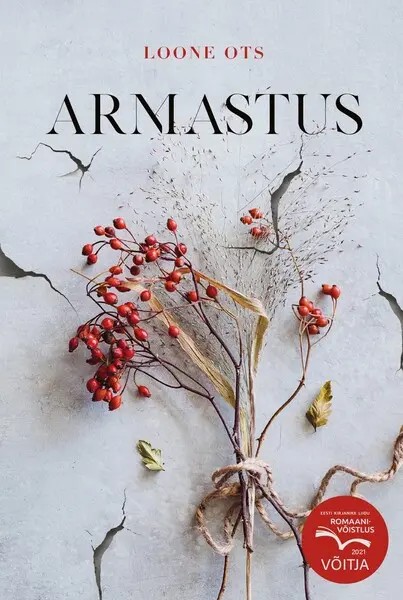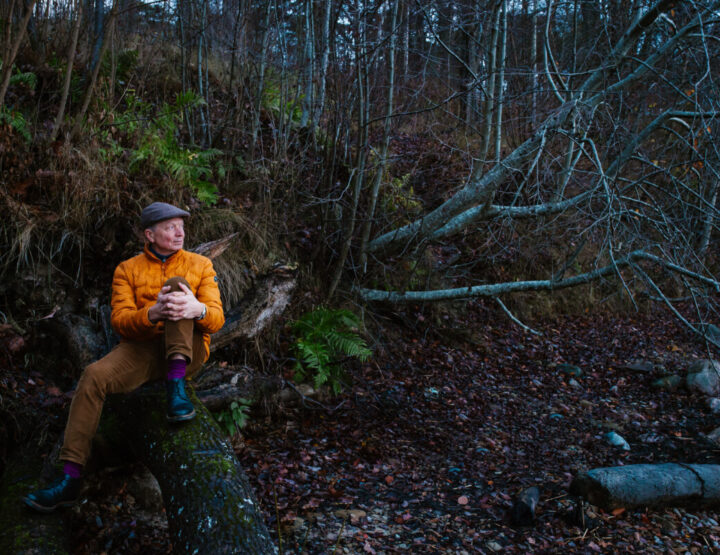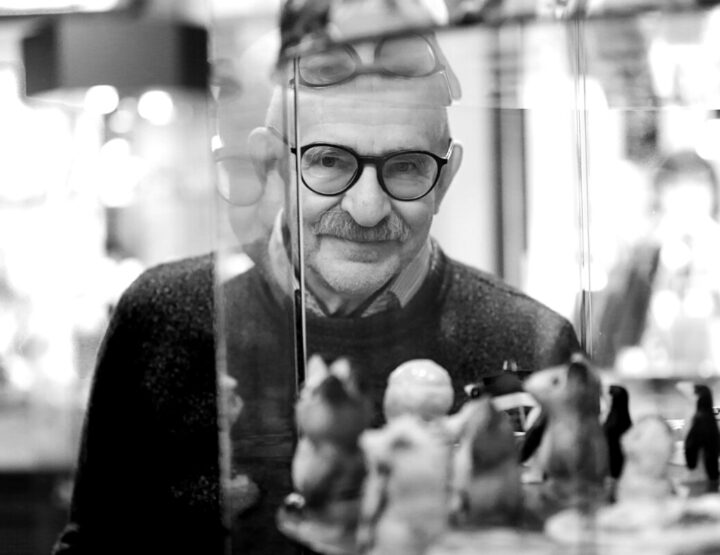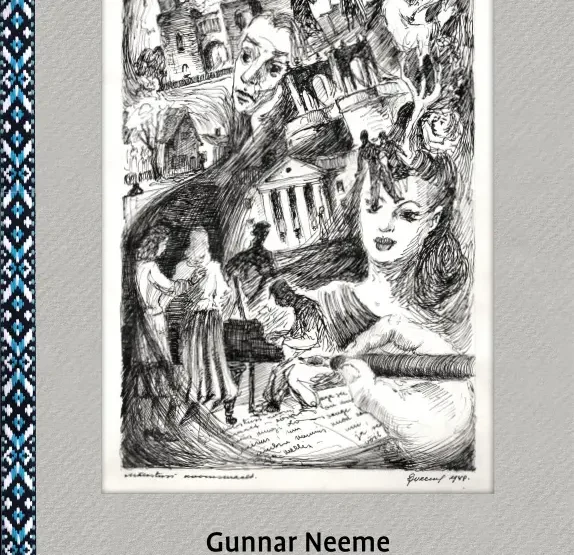5:07 a.m.
SALME
The snow has compacted into dense drifts. I have to lift my short legs high with every step and bring them down with full force into the depthlessly dark whiteness bathed in starlight. It is a new moon. A time of darkness, opportune for all sorts of mardused. “Mardus: an apparition foreboding misfortune or death; a banshee.” The mardus of Estonian folklore shrieks just like the snow beneath my heels. Shree, shrah, shree, shrah.
I glance over my shoulder. The buildings slide down the hillside like the sun setting into a vast swamp. A hedge of fir trees pecks the sky like an army of ravens. How is my mind constantly filled with such poetic thoughts?
I barged right into the shed – something told me Isi wasn’t asleep. My intuition was correct. He stood before me, cloaked in sheep musk. A true Estonian. German shepherds wouldn’t pick up his Jewish scent. Neither would Estonian mongrels. A dog has instincts, which is their impediment. A human has a brain, quick reasoning, and the ability to draft and demand papers. A human doesn’t care what a man without papers smells like. He just reaches out his hand and barks “Ausweiss!” Back when we played Bismarck, in Kratt’s childhood bedroom (I was given strict instructions to stifle any outbursts of laughter so as not, Lord forbid, to bother her famous papa, our grand Estonian professor and poet. Kratt’s mother wore heelless slippers at home and appeared to walk around on tiptoe, even though it was somewhat of an impossible feat given her rotund figure), I’d always declare “Pass!” and show my empty hands. I could pass because I had no cards. Now, I’m so often required to extend a hand containing my passport, my pretty little fingerprint-stained Ausweiss, because otherwise I’m without a pass and that’s it for me.
I could easily be deemed suspicious without one! A six-pointed star would be stamped on my forehead, just like that. Komplett. It wouldn’t matter that my family has lived in Kuustle for generations: one hundred and fifty years, according to the church records. It wouldn’t matter that we’ve never intermarried with a single Gypsy or Jew. My petite frame, curly black hair, darker-than-average eyes, and delicate bone structure would give me away. I’d be hooked up to measuring devices and have a ring like a medieval instrument of torture put around my head. They used it to torment the noble artist Cavaradossi, even though he was Italian. Aryan.
Shree! Shree! Shree! Shrr . . .
My leg shoots through a gap beneath the snow. The landscape of South Estonia is bumpy, with hills and hollows chasing one another. But the soil in these parts has been the blackest since time immemorial. Now, I’ve got snow in my boot. I’m forced to tug it off and empty it of the white powder in the middle of this terrible cold that knocks the breath out of you. Some of the snow has already frozen to my wool sock – I rub my mitten against it furiously.
But the path is visible. The ruts are clearly defined, hollowed by my father and brothers’ trips back and forth with the hay wagon. I will not get lost. In one kilometer, it will intersect with the main road, which stretches for several more kilometers before reaching the county highway that leads straight to the courthouse. We Estonians are tireless walkers, even if our hair is black.
Isi stood in the shed, smelling like sheep. He raised his arms as if intending to embrace me, but then froze. A kaleidoscope whirled in his eyes (though how could I see them with the space so dark and the stars so distant outside the tiny window?) and I realized his happy surprise had turned first into a question, then fear. Fear has no scent, at least not in sheep sheds. But it does have a stance—as rigid as that of a peasant whose master turns to him with a raised whip.
“Isi! I know what we’re going to do!”
My tone was much louder than it needed to be. I wanted to laugh in his presence. I wanted my laughter to warm the shed where the ewes’ bodies were unable to keep away the frost. I wanted it to transform his expression; for it to bring sparks of joy to his eyes.
I clasped his extended hand.
“Sit! Let’s sit down!”
I had no need to sit. I didn’t want to. I had no patience for sitting; I was in a hurry. But he’d be pleased to share my presence, if even fleetingly.
“I’m going to Tartu! I’m going to the university! Right now!”
Isi was baffled, naturally. I’d gone too fast for him once again. I was too hasty for Uku, too, but he just shook his head, cleaned up my latest opus, and remarked without glancing up from his desk: “Can’t you type a little more slowly on that contraption of yours? There is an unbelievable number of typos here!”
And to refrain from further scolding, he blew a smoke ring from his thyme-stuffed pipe. I, however, felt proud to have typed up the paper on a typewriter. On my personal typewriter.
Many families shed their possessions during that fresh Red summer. Not for rubles, but for gold. My confirmation bracelet changed hands. It was too big for my wrist, anyway, though Mother and Father tried to convince me to take it to a jeweler. I was too lazy, so the piece collected dust in a drawer until Bernard and Maria mentioned that the owner of a portable Hermes Baby typewriter wanted to sell it quietly.
I’d taken an elective course in shorthand and typewriting in secondary school. The moment I heard the offer, I whooped like an Apache. I showed off my prized new possession at the student club, where several fellows reacted to my gushing excitement with a startled look and pretended not to hear.
Fear comes in many shades.
I am overly hasty; I often get ahead of myself. In school, I was always the first to finish my mathematics exams. The teacher would occasionally hand it back and tell me to try again with patience.
Alas, reengaging focus was never my forte. She would delight to see me scrutinize the grid paper and, as payment for her generosity, I’d feign adding a couple extra dashes to the assignment before handing it back in and accepting my C. “Careless mistakes,” clucked the teacher, who was smart and well-intentioned, and deported during the year of Red occupation. But enough about that.
“I’m going to go see Selma, Isi! She works at the archive. They have loads of forgotten documents, all kinds of birth certificates. Isn’t that wonderful?”
Isi didn’t respond. The slightest movement would betray his nervousness. For centuries, two millennia and longer, the Jewish people have learned to control themselves, to keep themselves in check, to not give away an act or emotion with even the tiniest blink. Isidor regarded me as if I were an ancient prophetess. Questioningly.
“We’ll find you a birth certificate. I can’t promise an Aryan one, but at least half-Aryan. A regular Estonian yokel, at any rate. So long as you, a son of Moses, have no qualms about becoming the son of an enslaved people.”
Isi understood. He squeezed my hand. In his quiet, restrained manner, he thanked me for my willingness to undertake such a dangerous task to help him.
Him, truly?
“How will you get to Tartu.”
It wasn’t a question. It was a statement. I can’t get to Tartu. At least not today. I’ll need an Ausweiss. I’ll need a travel permit. I’ll need a horse or a car or a truck.
And the sand is trickling in the hourglass.
“I’ll go by foot,” I remarked as if it were the most natural thing in the world. As if der Weltberühmte Universit’t Dorpat were just an hour-and-a-half Spatziergang away. Noticing him twitch, I added:
“I’ll walk to the courthouse. There, I’ll acquire a travel permit. And then I’ll continue by car. I’ll say I heard something on the radio about the University of Dorpat being back in session and I wish to continue my studies. In the doctoral program. And to do that, I need to show up in person and discuss the topic of my thesis with my advisor, Uku Masing, Doctor of Theology.”
Isi leaned in closer. In addition to musk, his hair radiated the smell of cold. It is a good smell. My father smelled that way when I was just a tot and he returned from a far-away city, the name of which I still couldn’t pronounce: Talltu. Tartu.
Then, at barely a whisper, delicate as summer mist:
“Salme! Why?”
I flinched away. Why? I knew I shouldn’t make a single promise; shouldn’t allow him to kindle any hope. Only friendship. Or, well, the conviction that I’d defend anyone, be they Isi or an itinerant old woman or an elderly Jewish man who dodged a bullet.
But would I protect a communist, too? Even a commissar?
There is no answer to that question. Men from our village were killed in the summer war, too. Mrs. Kooreste was executed without committing a single offense against the Reds. Her children are now orphans. Should we take revenge?
The Hour of Retribution Is at Hand! declared the new regime’s first propaganda posters, this time in German. Nearly a dozen Reds who failed to hide in the woods or hightail it towards Russia were taken to the courthouse and lined up against the wall. Afterward, the men of our village were ordered to bury them. The Aryans could dirty their hands with blood, but not with a tool so mundane as a shovel. My brother Kusti was one of the gravediggers. He came home, cleansed himself in the sauna, drank himself drunk, and didn’t speak for several days.
Yes, why?
Was it merely a selfless wish to help?
Or was it . . . ?
“I’m leaving at once, Isi. Maybe there’ll be a car driving somewhere close to Viljandi. The trains aren’t reliable. Everything will work out. I’ll be back soon.”
A headshake, barely perceptible. I might have just imagined it in the darkness.
“What will happen if they find you rummaging through the archive? There are informers everywhere. You know that.”
And before I could come up with a witty and carefree response:
“Selma has a tiny baby. Just an infant. If she loses her job or . . .”
Yes. It’s true. Isi, who is in love with me, who loves me more than anyone in the entire world, wasn’t just thinking about me. He was also thinking about Selma, whose husband died while attempting to put out the fire that engulfed the chemistry building during the bombings, as it also contained their apartment and the talented twenty-four-year-old intellectual’s recently finished translation of the Livonian Chronicle of Henry. Only the translation met its end in the fire, though: Rudolf was struck by shrapnel on the roof. Heavy and eight months pregnant at the time, Selma had to identify the body. The day of his senseless, needless death was July 14th— Fête nationale. They’d been married for barely a year.
That is why Isi is precious to me. Regardless that the kind of love he wishes for there to exist between us simply cannot be.
I stood and patted my mittened hand on his slender fingers.
“We won’t get caught, I promise! And even if I do, then I’d like to see the man who refuses to release me immediately and with apologies to boot!”
I burst into laughter, just a little feigned, and allowed the door to slam shut behind me. I didn’t look back until the thick firs hid the window of the shed.





